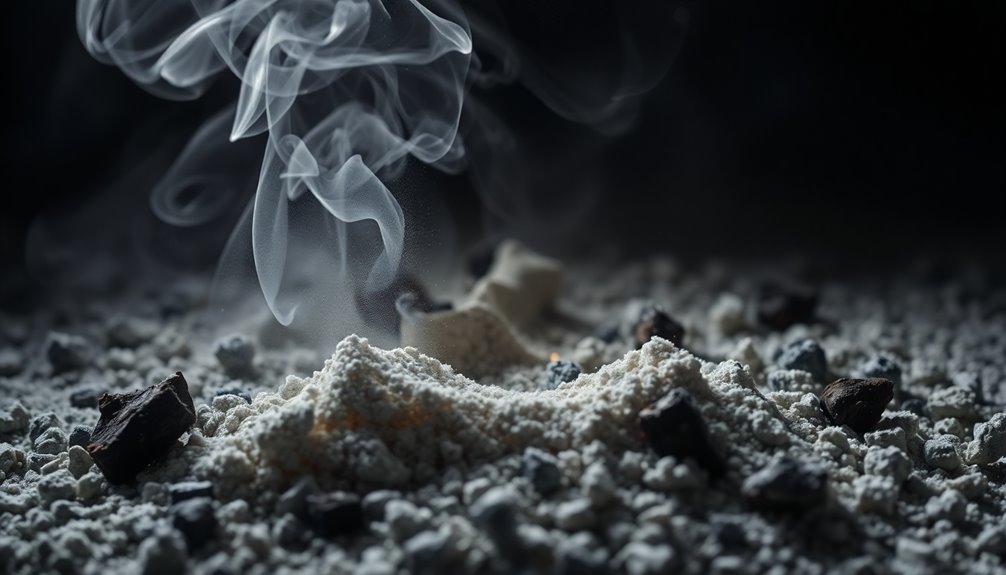Ash smells different depending on its source. You might notice a warm, smoky aroma from wood ash, which often evokes cozy memories. Cigarette ash, on the other hand, carries a pungent, acrid scent that many find unpleasant. Campfire ash offers an earthy fragrance reminiscent of nature, while volcanic ash has faint sulfuric notes. Each scent can stir emotions and cultural connections—like the calming aroma of incense ash, often used in spiritual practices. Want to uncover more about how ash impacts your feelings and experiences? There's a lot more to explore about this fascinating topic.
Key Takeaways
- Wood ash has a warm, smoky aroma with sweet notes, reminiscent of cozy fire-lit evenings.
- Volcanic ash carries faint sulfuric notes, lacking strong fragrance due to its mineral content.
- Cigarette ash emits a pungent, acrid scent associated with crowded, negative environments.
- Incense ash features varied aromas that promote calm and spiritual reflection, enhancing mindfulness practices.
- Campfire ash offers an earthy fragrance that evokes joyful outdoor gatherings and a connection to nature.
Introduction

When you think about the smell of ash, it's easy to overlook how much it varies depending on what was burned. The ash smell from wood creates a warm, smoky aroma that carries hints of charred wood and a touch of sweetness. In contrast, volcanic ash would still lack a robust fragrance, offering only faint traces of sulfur due to its mineral content. If you've ever caught a whiff of cigarette ash, you'd notice a pungent, acrid scent that results from burning tobacco and numerous chemicals, which can be quite off-putting.
Then there's incense ash, which can present a variety of aromas, influenced by the natural ingredients used during the burning process. This type of ash smell is often linked to spiritual practices, evoking a sense of calm and reflection. Finally, the distinct scent of campfire ash brings to mind an earthy fragrance created from organic materials like wood. Each type of ash carries its unique scent profile, reminding you that even something as simple as ash can tell a story about what it once was.
Description of the Smell

The smell of ash can evoke a range of emotions and memories, each type carrying its own distinct characteristics. When you encounter wood ash, you'll notice a smoky scent paired with sweet notes from charred wood, which can remind you of cozy evenings by the fire. In contrast, volcanic ash doesn't offer a strong odor, but you might detect faint sulfur traces that hint at its mineral origins.
If you're near cigarette ash, the pungent, acrid smell is hard to ignore, resulting from the combustion of tobacco mixed with a cocktail of chemicals. This scent can be off-putting and often brings back memories of crowded spaces or late-night gatherings. On the other hand, incense ash presents a more complex aroma. It varies based on the natural ingredients used, often evoking a sense of calm or spirituality.
Lastly, campfire ashes have a distinct, earthy fragrance that takes you back to outdoor adventures, making you feel connected to nature. Each type of ash offers a unique sensory experience, inviting you to recall moments tied to its distinctive smell.
Source and Composition

Ash's distinct smell directly relates to its source and composition. When you encounter wood ash, you'll notice a smoky scent, rich with the aroma of charred wood. In contrast, volcanic ash may surprise you with faint sulfuric notes, highlighting the diversity in ash's olfactory profile. The primary components of ash are inorganic minerals, with carbon playing a pivotal role in delivering that characteristic smoky aroma.
Different materials burned yield unique chemical profiles in ash. For example, wood ash contains potassium carbonate, which contributes to its scent, while charcoal ash is primarily composed of carbon, accompanied by trace minerals. You'll also find that moisture can significantly influence how ash smells, intensifying or softening the familiar smoky notes you might expect.
Moreover, the conditions under which materials combust can affect the resulting ash's scent. Industrial processes might create ash with chemical odors that differ from those in natural sources, showcasing how source and composition dictate the overall aroma of ash. Understanding these factors can deepen your appreciation for the varying smells you encounter in different ash types.
Typical Scenarios or Environments

In various environments, the smell of ash can evoke powerful memories and feelings. When you gather around a campfire, the earthy aroma of campfire ash, mixed with the charred scent of burning wood, brings back memories of laughter and warmth shared with friends. Each whiff transports you to those cozy outdoor gatherings, where stories are told under the stars.
In contrast, if you find yourself in a yoga studio, the smell of incense ash fills the air, offering a soothing atmosphere. The diverse aromas from different ingredients create a spiritual ambiance, encouraging relaxation and meditation.
On the flip side, cigarette ash presents a much less pleasant experience. Its acrid and pungent scent can be irritating, often reminding you of crowded bars or smoky rooms that you might want to avoid.
Then there's charcoal ash, which carries a rich, smoky flavor tied to grilling. This scent can instantly make your mouth water, conjuring images of backyard barbecues and delicious meals shared with loved ones. Each of these scenarios showcases how the scent of ash can shape your experiences and memories.
Emotional or Cultural Associations

Throughout history, the scent of ash has carried deep emotional and cultural significance across various societies. You might find that the aroma often symbolizes purification and transformation, evoking feelings of renewal and humility. In Hinduism, for instance, the sacred vibhuti ash used in rituals fosters a strong sense of devotion and spiritual connection, reminding you of the profound emotional ties people have with ash.
As you reflect on gatherings and celebrations, the scent of ash may bring back memories of community spirit and nostalgia. Many cultures associate the aroma of incense ash with meditation and spiritual practices, enhancing your sensory experience as you seek tranquility. This connection to mindfulness can be deeply comforting.
Additionally, in some belief systems, ash from cremation holds significant emotional meaning, representing the cycle of life and the link between the physical and spiritual realms. When you encounter the smell of ash, it can evoke a sense of introspection and connection to something greater, reminding you of the intricate relationships between life, death, and renewal that permeate various cultures.
Health or Safety Considerations

While you might associate the smell of ash with comforting memories or spiritual practices, it's crucial to consider the health and safety implications that come with exposure. Inhaling ash particles can pose significant respiratory health risks, especially for those with pre-existing conditions like asthma or bronchitis. The fine particulate matter in ash can exacerbate lung diseases and irritate your respiratory tract.
Wood fire ash contains volatile organic compounds (VOCs) and particulate matter, which can lead to serious health issues. Prolonged exposure, particularly from industrial sources, might cause skin and eye irritation as well. Heavy metals and other harmful substances can also contribute to toxicity, making it essential to be cautious.
If you find yourself in an environment with ash, be aware of the acute health responses it can trigger, such as coughing, throat irritation, and difficulty breathing. Sensitive populations, including children and the elderly, are especially vulnerable. To minimize inhalation risks, ensure proper ventilation when dealing with ash indoors. Wearing masks can provide an additional layer of protection during cleanup or exposure, helping to keep you and your loved ones safe.
Final Thoughts

The lingering aroma of ash evokes a complex interplay of memories, emotions, and cultural meanings. You might find that the scent varies greatly depending on its source. For instance, wood ash gives off a rich, smoky scent that can remind you of cozy fires, while volcanic ash may carry faint sulfur traces, lacking a strong smell altogether. Each material burned produces a unique chemical profile, influencing how the ash smells. Cigarette ash, for example, has a pungent, acrid aroma due to the burned tobacco and added chemicals.
When you think of ash from culinary uses, like wood or vegetable ash, you'll likely recall its flavor-enhancing qualities, showcasing its multifaceted olfactory properties. Moreover, ash holds cultural significance in various traditions, often seen as a symbol of purification and renewal. This deeper meaning can transform the way you perceive its aroma.
Ultimately, the scent of ash is more than just a simple smell; it's a blend of personal memories and broader cultural associations. By understanding these nuances, you can appreciate the rich tapestry that the aroma of ash weaves into your life.
Frequently Asked Questions
Do Ashes Have a Smell?
Yes, ashes do have a smell. When you encounter them, you'll notice that the scent can vary widely depending on the source. For instance, wood ash often gives off a smoky, sweet aroma, while cigarette ash has a pungent, acrid scent. Factors like the temperature and moisture levels in the environment can also influence how strong that smell is. So, next time you come across ashes, pay attention to their unique fragrance!
Does Ash Smell Good?
You might find that ash can smell good, depending on its source. For instance, wood ash from a cozy campfire often evokes warm, nostalgic feelings. If you've grilled food over charcoal, the smoky aroma can enhance your culinary experience. Incense ash, derived from natural ingredients, may also provide a rich, calming scent during relaxation. However, not all ash is pleasant; industrial ash can release acrid odors you probably wouldn't enjoy.
What Do Fire Ashes Smell Like?
When you encounter fire ashes, you'll notice a smoky scent that's often rich and earthy. This aroma comes from charred wood and can have sweet undertones, influenced by the type of wood used. If the ashes are dry, they might smell more intense, while moisture can make them seem damp or earthy. Remember, inhaling ash particles can be harmful, so it's best to enjoy the scent from a safe distance.
What Does Ash by Ashley Benson Smell Like?
When you experience "Ash" by Ashley Benson, you'll notice a captivating blend of warmth and sensuality. The fragrance opens with fresh bergamot and white tea, instantly uplifting your senses. As it develops, floral heart notes of jasmine and peony emerge, adding a feminine touch. Finally, the base notes of amber and cedarwood create a lingering, comforting aroma that envelops you, making it perfect for any occasion. You'll feel effortlessly alluring wearing it.









